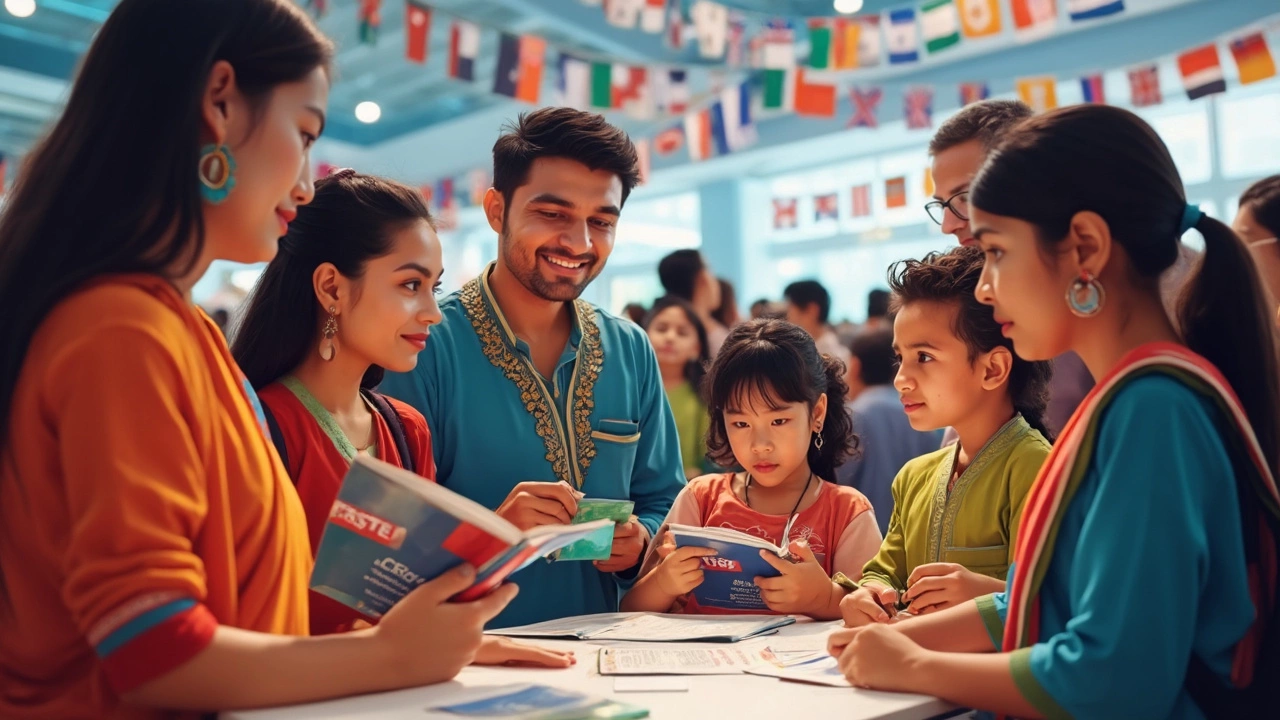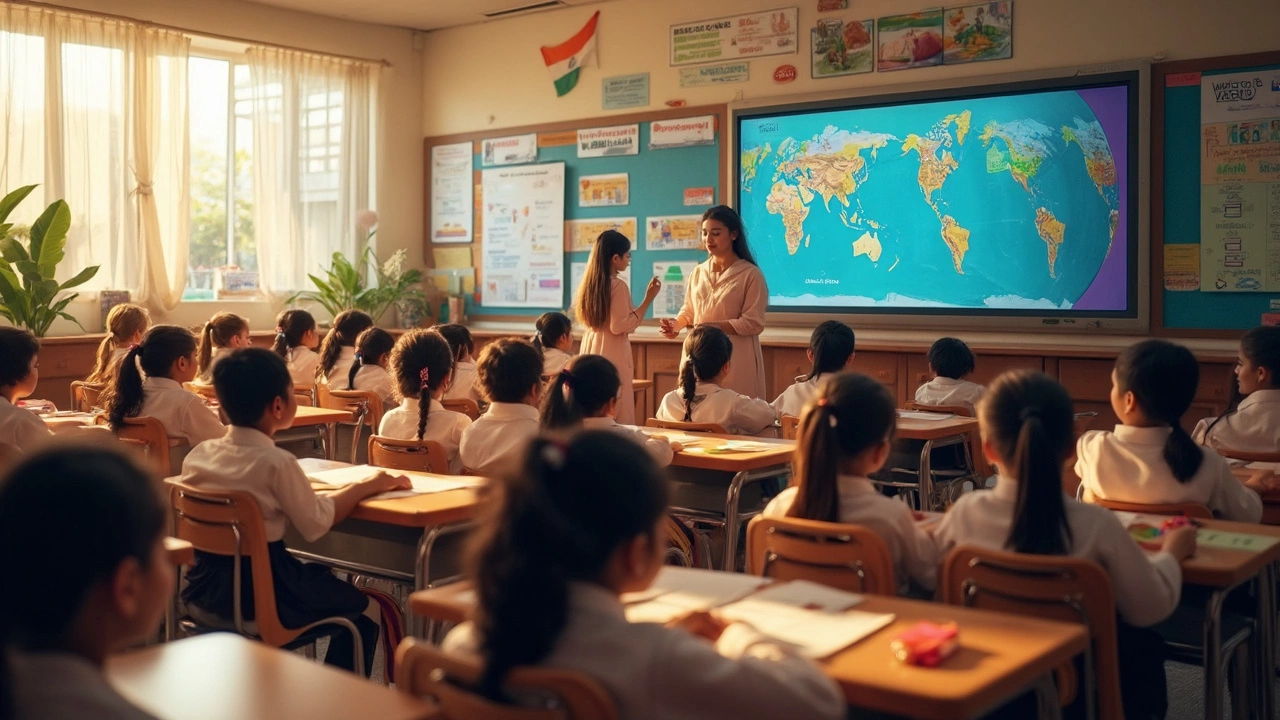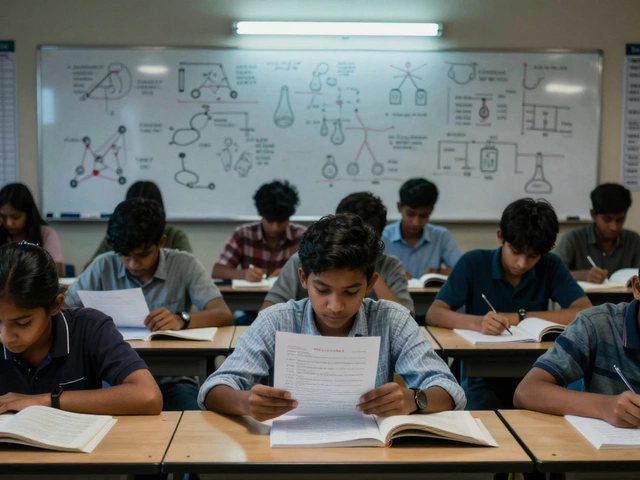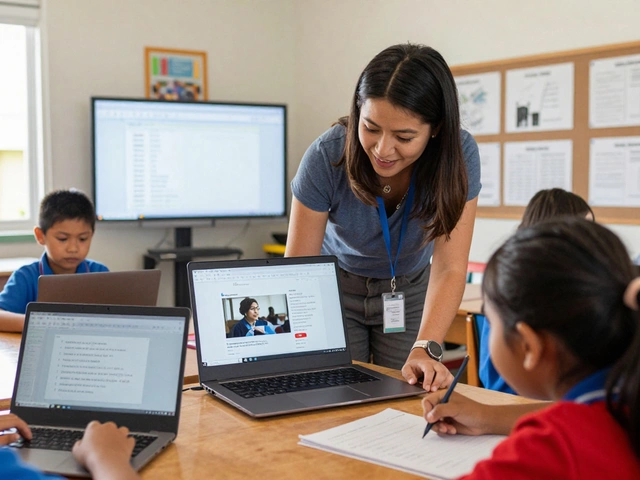Think the CBSE syllabus is just for students in India? That’s actually not the case. Indian families living overseas often want to keep their kids on the same academic track they’d get back home, and that’s where CBSE schools come in—some of them are scattered across Asia, the Middle East, and even a few spots in Africa. Places like Dubai, Abu Dhabi, and Singapore have real CBSE-affiliated schools, not just “Indian schools” in name.
But don’t assume every school that advertises “CBSE” abroad is the real deal. If you’re on the hunt, check the official CBSE website for their list of international affiliations—there’s a downloadable PDF with schools from the UAE to Saudi Arabia and beyond. If you’re thinking about moving or even just staying abroad short-term, knowing that your child can transition back to an Indian school later without missing a beat is a huge relief. And for lots of expat families, that consistency means less stress and less drama around school changes.
- CBSE Beyond Borders: Where in the World?
- Who Chooses CBSE Outside India—and Why?
- How Genuine Are Overseas CBSE Schools?
- What’s Different About CBSE Abroad?
- Tips for Parents: How to Choose and What to Check
- Challenges and Surprises: Real Stories from Families
CBSE Beyond Borders: Where in the World?
It might surprise you, but CBSE schools abroad aren’t some rare phenomenon. As of this year, more than 230 schools outside of India are officially recognized by the CBSE Board. You’ll mostly spot them across the Gulf—think the UAE, Saudi Arabia, and Oman. Dubai and Abu Dhabi lead the charge, with dozens of schools catering to Indian expat families. The Middle East snags the top spot, but you’ll also find CBSE schools in places like Singapore, Malaysia, Nepal, and even a couple in Africa, like Kenya.
If you’re looking for a school that genuinely sticks to the CBSE syllabus, it’s smart to check the official CBSE website. There’s a downloadable list where you can spot schools by country, city, and even check their affiliation status and number. Here’s what the spread looks like by region, based on the latest data:
| Region | Number of Schools |
|---|---|
| UAE | 85+ |
| Saudi Arabia | 10+ |
| Oman | 17 |
| Bahrain | 6 |
| Kuwait | 18 |
| Qatar | 11 |
| Singapore | 3 |
| Nepal | 10 |
| Kenya | 2 |
| Malaysia | 2 |
Most of these schools were set up because there’s a huge community of Indian families in these countries, and they want their children to continue with the CBSE curriculum. The schools have to follow the same guidelines and rules as ones in India to keep their affiliation—meaning they answer to the CBSE Board in Delhi, send their students for board exams, and stick to the same textbooks. That gives families a big dose of certainty, especially if they plan to return to India after a few years or want to keep career doors open for both Indian and international universities.
If you want to double-check a school’s credentials, that CBSE affiliation number is your friend. No valid number? Red flag. Plenty of schools say “CBSE” in the name but aren’t actually approved, so don’t fall for marketing—do the homework.
Who Chooses CBSE Outside India—and Why?
Most families who pick a CBSE syllabus outside India are Indians living abroad—think software engineers in Dubai, doctors in the UK, or corporate professionals in Singapore. Basically, if a parent expects their child might return to India and rejoin school there, sticking to CBSE curriculum just makes life simpler. There’s no weird gap or confusion if the kid goes back and forth between countries.
But it’s not just about hassle-free transfers. Some families like the comfort of a familiar system. Indian expats really value how CBSE is built for Indian university entrance exams (like JEE or NEET), so choosing a CBSE school abroad keeps their kids ready for those big tests down the line. That’s one less thing to stress about if your plan is to come back to India for college.
There’s also a smaller group—non-Indian families—who find the English-medium, math and science-heavy CBSE curriculum attractive. In places like the UAE, there are even local families picking CBSE over their home systems because the schools score well in results and are cost-effective compared to big-name international schools.
- Parents working on short-term contracts overseas.
- Families who want easy academic transitions between India and abroad.
- Students aiming to keep doors open for Indian entrance exams or universities.
- Kids who connect better with Indian languages or cultural events in schools.
Here’s something interesting: According to the official CBSE records in 2024, there were over 240 CBSE-affiliated schools in 28 different countries, with the UAE alone having more than 80 schools. That’s a huge network catering to the Indian expat community and beyond.
How Genuine Are Overseas CBSE Schools?
Spotting a true CBSE syllabus school outside India isn’t as simple as just looking at the name. The real test? Official affiliation and regular recognition from the Central Board of Secondary Education in India. Only schools that get this seal can honestly deliver the actual curriculum, exams, and certificates that matter for students who plan to move between India and other countries.
The CBSE itself publishes an annual list of international affiliated schools on its website. If a school isn’t there, it’s not legit—no matter what their flashy brochures say. Plenty of schools brand themselves as “Indian curriculum” or “CBSE pattern,” but that might just mean they picked a few textbooks. When in doubt, always cross-check the school’s CBSE affiliation number, which should appear on its website or in the admin office.
In 2024, there were over 240 officially affiliated overseas CBSE schools, most of them in the Middle East. Just for a quick look, here are the top countries hosting official CBSE schools:
| Country | Number of CBSE Schools (2024) |
|---|---|
| United Arab Emirates | 80+ |
| Saudi Arabia | 30+ |
| Oman | 20+ |
| Qatar | 15+ |
| Singapore | 4 |
Being genuine involves more than just following the textbook. True CBSE schools abroad follow CBSE rules for teacher qualifications, assessment styles, and even holidays. Here's a quick way to spot the difference:
- They use the exact CBSE curriculum and syllabus issued by the Indian board.
- They conduct board exams according to CBSE schedules and send exam papers to India for evaluation.
- They follow guidelines for staff—qualified teachers, proper teacher-student ratios, and certified administrators.
- Their students can register for the same Indian national board exams as millions back home.
As Dr. Joseph Emmanuel, Director for Academics at CBSE, explained,
"Affiliation is a transparent process. Only those schools that fulfill all norms, including infrastructure and academics, are recognized as genuine CBSE schools abroad."
If you want a real CBSE school abroad, double-check its name in the latest CBSE directory. Don’t get carried away by marketing—there’s way too much at stake when it comes to your child’s education and their future options.

What’s Different About CBSE Abroad?
So, CBSE outside India isn’t always a straight-up copy-paste job from what you’ll find in Delhi or Mumbai. CBSE syllabus schools in places like the UAE or Singapore use the same core textbooks and exam patterns, but a few things do change once you cross borders.
First off, the school day might look a little different. While schools in India sometimes start early and go on till 2 or 3 PM, many CBSE schools abroad adjust their timing to fit local rules—some wrap up by noon in the Middle East due to heat or cultural norms.
Holidays are another thing. While Indian CBSE schools will have long breaks during Diwali and Holi, those abroad often slot in local holidays—think Eid, UAE National Day, or even Chinese New Year in schools around Southeast Asia.
Then there’s the language factor. Most international CBSE schools abroad stick to English as the main teaching language, but they usually offer an extra language like Arabic or French. Hindi and Sanskrit may still be options, but not always a given.
Check this out: according to official data, as of 2024, there are 87 officially affiliated CBSE schools international outside India. The majority of these are in the UAE, then Saudi Arabia, Oman, Qatar, and a handful in other countries.
| Country | Number of CBSE Schools |
|---|---|
| UAE | 42 |
| Saudi Arabia | 9 |
| Oman | 8 |
| Qatar | 6 |
| Singapore | 2 |
One key difference: these schools often have more resources for sports, arts, and global events, sometimes offering high-tech campuses or activities you won’t find in every Indian city. The vibe can feel less competitive too—some parents say there’s less “rat race” abroad, though the CBSE curriculum itself stays pretty challenging.
One word of advice? Always double-check that a school is affiliated with the main CBSE Board. Just because a school uses Indian textbooks doesn’t mean it’s legit. Only affiliated schools follow the real exam schedule, marking, and transfer process, which matters if your kid moves back to India or plans to write the board exams.
Tips for Parents: How to Choose and What to Check
Finding a CBSE syllabus school abroad that actually delivers what it promises isn’t complicated when you know what to look for. Here’s what you should check before signing up your kid.
- Official Affiliation: Go straight to the CBSE website and download the list of schools officially linked with CBSE. Some international schools might advertise CBSE just to attract Indian expat families, so don’t skip this step. There are fewer than 250 CBSE-affiliated schools overseas (as of early 2025), most of them in the Middle East. If the school’s not on that list, keep looking.
- Curriculum Match: Even if the school is affiliated, check their website or ask the principal for their actual curriculum calendar and book lists. Sometimes schools swap out core materials because of local rules, so make sure it’s the real CBSE deal. This is really important for smooth transfers back to India.
- Exam Centers: Ask if your child will take board exams (Class 10 and 12) at the school itself or if you’ll need to travel to a different exam center. Logistics around exams can get tricky outside major cities.
- Teaching Quality: Get the qualifications of classroom teachers. Authentic CBSE schools are required to hire educators with B.Ed or similar degrees, just like back home. If possible, talk to other parents in the community—they’re your best source for first-hand info.
- Fee Structure: Overseas CBSE schools usually have tuition fees that are higher than local rates in India but can be lower than American or British curriculum schools in the same area. Some schools also add hefty extras for materials and activities, so ask for a full breakdown.
To give you a sense of the numbers, here’s a sample of CBSE-affiliated schools in different countries (2025 data):
| Country | Number of CBSE Schools |
|---|---|
| UAE | 84 |
| Saudi Arabia | 19 |
| Qatar | 12 |
| Singapore | 2 |
| Oman | 21 |
Last tip: Visit the campus, if you can. Look at facilities, talk to staff, and see if kids seem happy. Even the best CBSE curriculum needs a school that actually cares about students. Trust your gut—it matters a lot in the real education world.
Challenges and Surprises: Real Stories from Families
Plenty of families have shared what it’s really like moving kids into CBSE schools abroad. One big surprise? Even when the syllabus is the same, everyday life can feel pretty different. For starters, some schools follow a hybrid approach—combining CBSE curriculum with local education standards, especially for languages and cultural activities. If your child isn’t ready to learn Arabic in the UAE, for example, that can throw you off at first.
Parents in the Middle East often mention how important it is to double-check affiliations. A mom in Dubai said they nearly landed at a school claiming to be CBSE, but it wasn’t on the official list. A quick check on the CBSE syllabus website saved the day. That’s not rare—rogue schools pop up sometimes, so always verify before you commit.
Another thing families talk about is exam stress. Some overseas schools set their own pace, and it’s not always in sync with schools in India. That means if you need to move back unexpectedly, your child might face a lot of catching up. Several parents have said teachers are helpful, but you might have to pay extra for tutoring to bridge those gaps, especially around Class 10 board exam time.
| Top Challenges Reported | Percent (%) |
|---|---|
| Inconsistent academic calendar | 28 |
| Lack of familiarity with local language | 22 |
| Difficulty verifying school affiliation | 20 |
| Gaps in science/lab facilities | 18 |
| Cultural adjustment for kids | 12 |
It’s not all hiccups, though. Many parents in places like Abu Dhabi and Singapore have found that kids adjust surprisingly quickly, especially when schools support them with orientation programs and buddy systems. Sometimes, international CBSE schools even offer extra subjects or activities missing back home, which some kids love. Just remember: the more questions you ask up front, the fewer surprises later.





